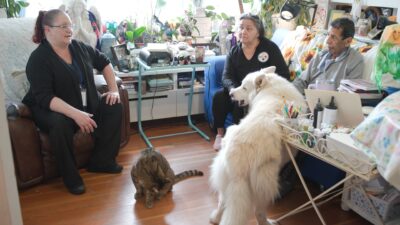We often use the word depression very lightly, as a synonym for sadness. We can be “depressed” that the day is cloudy or when we had a bad day at work. Yet depression is more than simply sadness; it is a psychiatric diagnosis that requires assessment and treatment.
That distinction is a critical one when we are dealing with grief and loss. One of the very first psychological articles, one that really began the study of grief, was written by Sigmund Freud, who was asking the same question.
Sadness is a normal and natural response to loss, but when does that sadness become so intense that it becomes the life-limiting mental illness of depression? That debate did not end with Freud; we still struggle with differentiating grief and depression.
Perhaps the most common aspect of grief for many, sadness is expected after a loss. After all, someone we love has died and our life is now different. We might not only miss the person but all the activities we shared together. We may feel very alone. Even the most basic events such as eating or watching television are now different.
Our sadness may ebb and flow. We may be especially sad at holiday times or on other occasions such as birthdays, anniversaries, and especially as we approach the anniversary of the death. Winter may be difficult as, in many parts of the country, the increasing darkness and cold keep us isolated from others, which has been linked to season affective disorder, a form of depression.
But it is that ebb and flow of sadness that is one of the factors that differentiates the sadness of grief from depression. While our sadness may fluctuate, depression is relentless. The sadness of grief often comes in waves, mixed with other feelings and reactions, perhaps even positive ones or humor as we revel in a happy memory. But depression never wavers. Moreover, as we said, these moments of sadness are often prompted by events or reminders that center our focus on our loss. Depression is pervasive. In sadness, we may feel emptiness due to our loss. Depression is more personal; we may feel self-loathing and a sense of unworthiness, or even harbor self-destructive thoughts.
Depression, most importantly, is debilitating. When depressed, we become lethargic and largely incapacitated. We find it difficult to function in any of our key roles. We simply feel we cannot go on any longer.
Depression, of course, can be triggered by a loss. This is especially true if we have had a history of depressive events.
The sadness of grief is certainly common and understandable. We can expect it to come and go as we journey with grief. We may, over time, even learn strategies that help shorten or ease these moments of sadness—taking a walk, watching a comedy, or getting together with friends.
Depression, though, is an illness. Like any illness it needs to be treated by a professional. If you think you may be depressed, seek help.
By Kenneth J. Doka, PhD, MDiv, Sr. Vice President, Grief Programs, HFA and recipient of the 2019 Lifetime Achievement Award from the Association for Death Education and Counseling.


